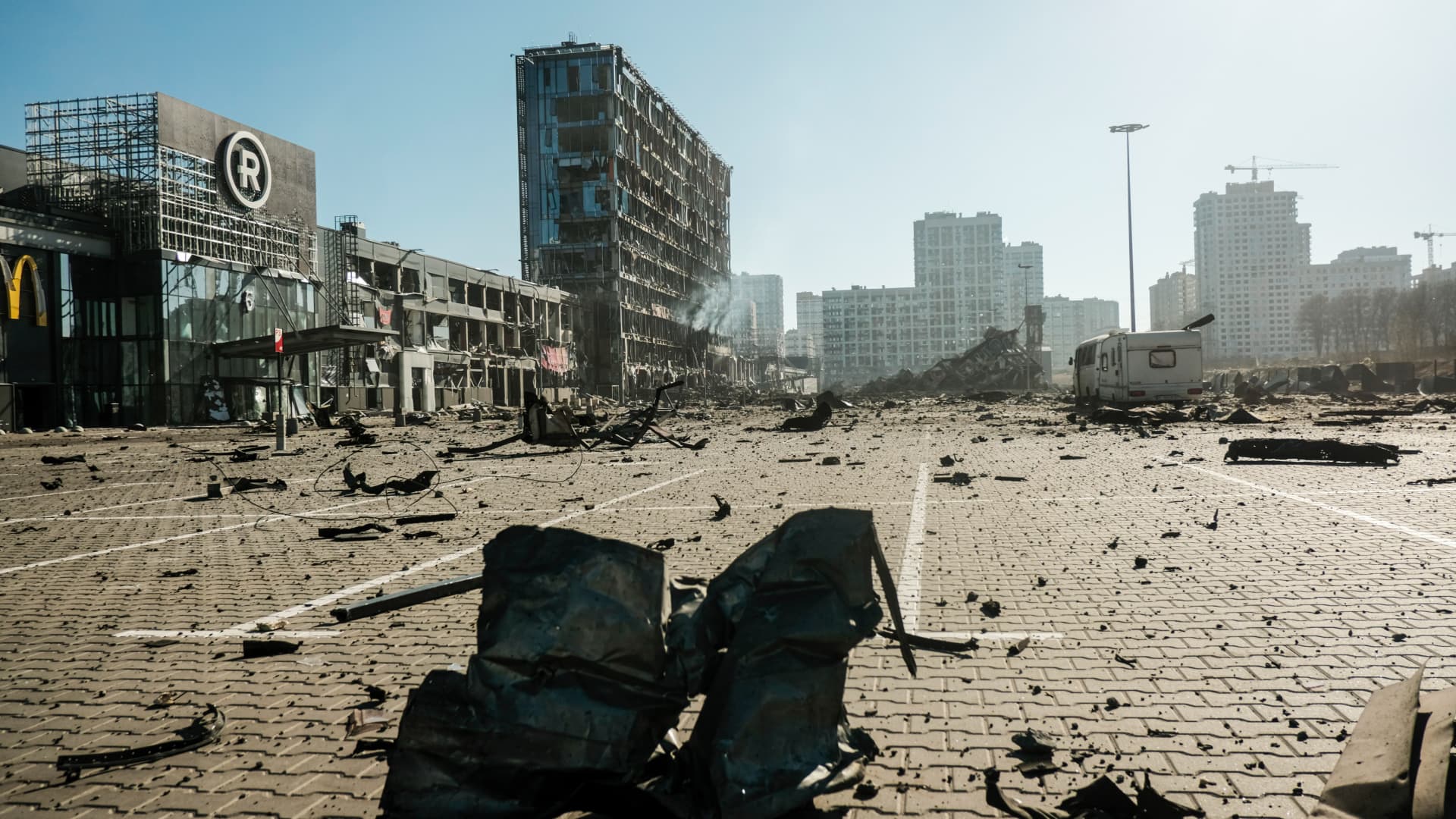
Ukraine’s leading climate scientist Svitlana Krakovska says the primary driver of the climate emergency and the root cause of Russia’s war with Ukraine are directly connected: Both stem from humanity’s fossil fuel dependency.
Speaking via telephone from her apartment in Ukraine’s capital of Kyiv, Krakovska told CNBC she’d lost track of the days of the week and had instead been referring to the number of days since Russia launched its unprovoked onslaught on Feb. 24.
The conflict has triggered a devastating humanitarian crisis, sent shockwaves through financial markets and left Russia increasingly isolated on the global stage.
“I should say that now it is not even a war. In the beginning it was like war because we had armies fighting but now Russia is just shelling our cities. It is just genocide of our Ukrainian nation,” Krakovska told CNBC.
“It is really scary — more scary even than the beginning because we don’t know when the next strike will be or in which city.”
The conclusion should be that the sooner we will stop our dependency on fossil fuels, the better world we will have for us and our children. This should be very clear.Svitlana KrakovskaHead of Applied Climatology Laboratory at the Ukrainian Hydrometeorlogical Institute
At the start of Russia’s full-scale assault, Krakovska had been leading a delegation of 11 Ukrainian climate scientists to help finalize the U.N.’s Intergovernmental Panel on Climate Change landmark report ahead of its release on Feb. 28.
Yet, even as Russia’s armed forces hit several Ukrainian cities with missiles, including Kyiv, Krakovska told colleagues at the IPCC that Ukraine’s delegation would “continue to work if we have an internet connection and no missiles over our heads.”
“I just said that: ‘OK, we in Ukraine will do our work. We will resist. We will try to survive’,” she said.
Within a few hours, however, it became clear that for many of Ukraine’s delegates this would not be possible. One colleague in Kharkiv was forced to seek shelter with their children as the northeast city came under fire from heavy shelling, while others sought safety away from the capital.
For Krakovska, the IPCC’s warning that the climate crisis may soon outpace humanity’s ability to adapt was clearly linked to Russia’s invasion of Ukraine.
“Of course, the real cause of the war is maybe not as a result of fossil fuels, but without fossil fuels it wouldn’t be possible,” the veteran climate scientist said. “It is an enabler.”
‘This is madness’
Krakovska, who heads the applied climatology laboratory at Ukraine’s Hydrometeorological Institute, knows Russia well.
She was born in Kyiv under the Soviet Union, studied meteorology in St. Petersburg and has traveled through Siberia, Chukotka, Kamchatka and the polar regions. Last year, she received an award from Ukraine’s President Volodymyr Zelenskyy for her work on an Antarctic expedition.
“For Russia to act with impunity … You see what they do, they are strong enough to threaten all of the world. They have started with Ukraine but in fact they can do everything, and nobody can stop them,” Krakovska said.
The IPCC report found about half of the world’s population is now acutely vulnerable to disasters stemming from the burning of fossil fuels, warning any further delay in concerted global action “will miss a brief and rapidly closing window to secure a livable future.”
Meanwhile, energy-importing countries continue to top up President Vladimir Putin’s war chest with oil and gas revenue on a daily basis. Analysis from campaign group Transport and Environment shows Russia’s military might is being reinforced by $285 million in oil payments made every day by European countries.
Indeed, revenue from Russian oil and gas was seen to be responsible for roughly 43% of the Kremlin’s federal budget between 2011 and 2020, highlighting how fossil fuels play a central role for the Russian government.
Krakovska said it was ironic that many Western countries, which had previously been seen in Ukraine as perhaps more free or more democratic, were disproportionately dependent on Russian oil and gas.
“The conclusion should be that the sooner we will stop our dependency on fossil fuels, the better world we will have for us and our children,” Krakovska said. “This should be very clear.”
The conflict in Ukraine has coincided with sharp rises in the prices of coal, oil and gas as countries scramble to replace Russian energy sources.
The rush to further deepen humanity’s dependency on fossil fuels in the aftermath of the crisis in Ukraine prompted a dire warning from U.N. Secretary-General Antonio Guterres.
“Countries could become so consumed by the immediate fossil fuel supply gap that they neglect or knee-cap policies to cut fossil fuel use,” Guterres said Monday in his first major speech on climate and energy since COP26 late last year. “And this is madness: addiction to fossil fuels is mutually assured destruction.”




